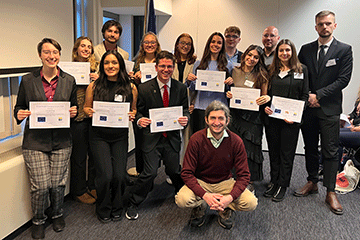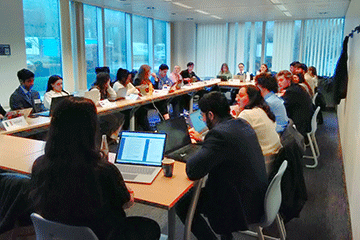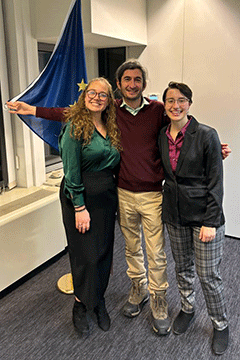News Detail
03/05/2024

The fate of European Union countries appeared to rest in the hands of 10 SUNY Cortland students for three days in Belgium during January, when they simulated ministers and diplomats trying to settle real-world issues as part of Global Model European Union (MEU) 2024.
From Jan. 7 to 10, Cortland’s student contingent — embedded with 110 total American and European student delegates — settled timely matters relating to Russia’s wars in Ukraine and Moldova, managed mass migration into EU countries, addressed EU’s environmental concerns in the Arctic, and ironed out particulars on the European Union’s role in the Indo-Pacific Region.
The host campus — located in the same city as the actual European Union — was the Brussels School of Governance, Free University of Brussels. Participants included students from 11 universities in seven countries: Belgium, Bulgaria, France, Germany, Romania, United Kingdom and the U.S.
Junior history major Joshua Bates of Rome, N.Y., portraying the government head of Croatia, quickly learned to curtail hours of fruitless circular verbal exchanges inside a small college conference room simulating an EU meeting room. Instead, in a hallway outside, he worked out a solution with a fellow delegate from another American university. Between them, they cut a deal, started a motion to end debate and executed a successful vote.

“Our motion was adopted that day. It all happened quite quickly,” said Bates, who is minoring in political science and international studies, and has his eyes on law school and a future as a prosecutor, public defender or government official.
“That kind of speaks to what the larger EU is about,” Bates said. “You didn’t speak on your own behalf. You developed an alter ego. What policies would be best for that country?”
This is the first time since January 2020 — the start of the COVID-19 pandemic — that SUNY Cortland students got the chance to travel abroad to participate in the annual hands-on experiment in governmental negotiation and diplomacy, which traditionally has involved participants traveling to either New York City or Brussels.
This year, the Global Model EU 2024 leaned into the following timely issues: the European Council negotiated EU policy regarding Ukraine and Moldova; the Council of Foreign Affairs focused on the EU role in the Indo-Pacific Region; the Environmental Council addressed EU policy in the Arctic region; and Justice and Home Affairs dealt with migration issues. Heads of state moved smoothly in between the four settings.
“This was an experiential learning opportunity for the students to put in practice their negotiation skills and international relations, European Union and historical knowledge skills,” said History Professor Scott Moranda.
Moranda co-organized and accompanied the students in the SUNY Cortland delegation with Alexandru Balas, professor and coordinator of the International Studies Program and director of the Clark Center for Global Engagement. Moranda also coordinates the university's Project for Eastern and Central Europe.
“They got to test their skills and knowledge in the company of approximately 110 students,” Moranda said.
Besides SUNY Cortland and four other American universities, the simulation included the American University of Bulgaria, the Universite de Lille (France), University of London Institute in Paris, Brussels School of Governance in Belgium, Babes-Bolyai University in Romania, and Schmalkalden University in Germany.

Additionally, several student participants played the role of the press, interviewing participants before the conference, asking questions during the press briefings, and producing a “newspaper” during the conference that highlighted the formal and informal negotiations.
Emma Efing of LeRoy, N.Y., who graduates this spring with a dual major in adolescence education in social studies and in history, served the Model EU as Germany’s minister of environmental affairs.
“Some key things this entailed was researching Germany’s goal for preserving the Arctic Circle and its environment and being able to negotiate for the rights of indigenous people in the Arctic Circle. Another important aspect of my negotiations was concerning the black carbon emissions and how much they should be reduced by and how fast.”
Model EU helped her learn how best to negotiate in a real-world environment.
“Learning how to find allies and negotiate compromises based on research and what would be best for Germany was a learning curve, but it made me a more confident person in my speaking skills and in my knowledge,” Efing said.
This Model EU foray has inspired her to plan a gap year after graduation of traveling across Europe to identify the perfect historical niche for her future graduate studies.
“I got to meet and befriend people from other countries and cultures, which made me realize how big and yet how connected the whole world is,” Efing said. “Being able to connect to others, do research and find a digestible way to present and talk about my research will help in my goals of being a teacher or a museum equivalent of a teacher.”
As the foreign minister of Germany, Sarah O’Connor of Commack, N.Y., a senior international studies major who is concentrating in global political systems, negotiated policies concerning the Indo-Pacific region’s relations with the EU.
“I learned the significance of effective communication and coalition-building in achieving diplomatic objectives and the importance of understanding diverse perspectives and interests when negotiating complex international issues,” O’Connor said.
Once she graduates in May, O’Connor’s immediate plan is secure a job with the federal government in Washington, D.C.
“I want to pursue a career in defense and military policy,” she said.
Layla Myers of Brockport, N.Y., headed Netherlands in the simulated delegation.
“The Brussels trip aims to simulate real negotiations, which consist of a lot of socializing and communication, not only in the conference room but before, during and after,” said Myers, a junior international studies major with a concentration in culture and global development.
She plans to use her degree to create a better future for youth by advocating for issues just like the ones debated in the simulation.
“This experience allowed me to feel what it would be like to really make a difference in our world today; it also showed me what it takes to do so,” she said.
During their time abroad, participants visited the European Union Parliamentarium to learn about the important work of the European Parliament representing the EU citizens; and the House of European History. They also received briefings from EU officials.
The EU Parliamentarium was located right next to the actual thing, Bates noted.
“It’s something I think we should have in the U.S.,” he said.

Finally, the Cortland contingent traveled to Brugges to explore the medieval town which is studied in-depth in several international studies and history courses at SUNY Cortland.
The SUNY Cortland students who participated also included: international studies majors Victoria Quick, a senior from Hurley, N.Y., Asha Younas, a junior from Woodside, N.Y., Donald Bosman, a junior from Endicott, N.Y., and Anthony Fridlikh, a senior from Staten Island, N.Y.; outdoor recreation major Savannah Adami, a junior from Albany, N.Y.; and community health major Ava Graziano, a junior from Washingtonville, N.Y.
Also joining the SUNY Cortland delegation were Andrada Rat, a 2023 SUNY Cortland exchange student from Cortland's international, institutional partner Babes-Bolyai University in Cluj-Napoca, Romania; and her university colleague, Vlad Farcas.
Once again managing the Model EU were co-directors Juan Arroyo from Ithaca College and Giulia Tercovich of the Brussels School of Governance; with help from Michelle Benson-Saxton and Collin Anderson at University at Buffalo, Alexandru Balas at SUNY Cortland and Zakhar Berkovich at SUNY Albany.
Organizers also credit the support of SUNY Cortland’s Sue Pettitt from the Clark Center for Global Engagement; Tina Russell, Cortland Auxiliary accountant; Joseph Fitzgerald, Auxiliary Services controller; and Daniel Condon, Campus Store director.
The participation of the students was made possible by generous contributions from the International Programs Office, the Dean of Arts and Sciences Office from the Myers Family Fund, the History Department, the Haines Fund, and the Clark Center for Global Engagement.
Next year’s Global Model European Union will run from Jan. 6 to 9 in New York City.
TOP IMAGE: All Global Model EU participants and faculty members converged on a staircase inside the Brussels School of Governance, Free University of Brussels.

